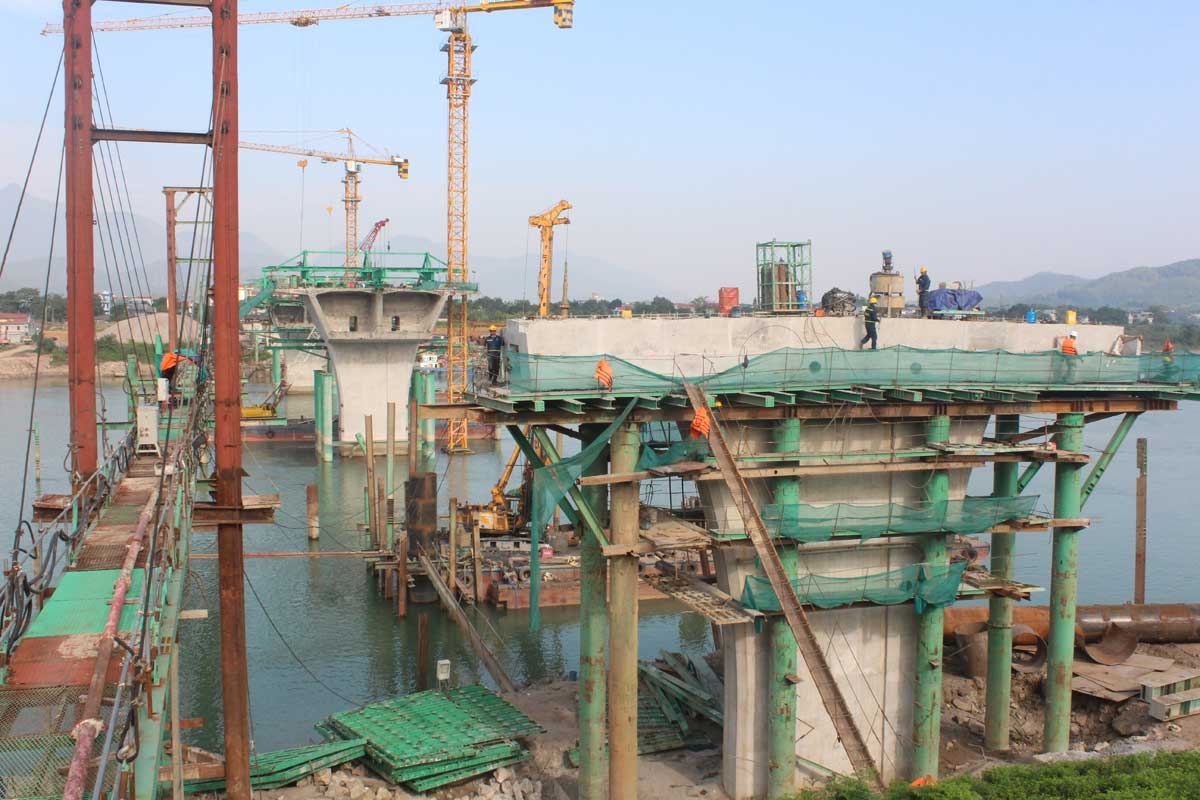
(HBO) - Hoa Binh 2 bridge project was approved by the Hoa Binh provincial People’s Committee under Decision No.2536/QD-UBND dated October 30, 2018, costing 590.81 billion VND from local budget and other legitimate sources.
As a key transport work, it is expected to contribute to improving
transportation infrastructure, become an architectural landmark and promote
investment to expand urban space in Hoa Binh city.
 The Hoa Binh 2 bridge (Hoa Binh city) is under
construction.
The Hoa Binh 2 bridge (Hoa Binh city) is under
construction.
To speed up the project’s progress and a road linking
National Highway 6 with Chi Lang road, the provincial Party Committee’s
Standing Board issued Conclusion No.303 on April 15 on prioritising capital for
projects.
Compensation and site clearance were carried out in
September 2019 on a total area of nearly 42,600 sq.m, including 26,490.1 sq.m
in Thinh Lang ward and 16,109.8 sq.m in Dong Tien ward. Up to 79 households and
organisations are subject to site clearance, including 13 households and two
organisations in Thinh Lang ward, 62 households and two organisations in Dong
Tien ward. The resettlement is expected to be arranged for 26 households,
including three in Thinh Lang ward and 23 others in Dong Tien ward.
Bored piles have been built for seven out of eight pillars
and half of the abutments. Six out of eight pillars have been completed. As
many as 17 out of 21 plate girder slabs were produced. K0 blocks were built on
pillars T3 and T4. The total volume of construction and assembling surpassed
179.8 billion VND, or 42.75 percent.
At present, the abutment M1 and bridgehead road could not be
built due to unfinished site clearance. In the near future, the contractor will
focus on building pillar T2.
Last year, 150 billion VND were earmarked for the Hoa Binh 2
bridge. The figure this year was 150 billion VND. All of them have been
disbursed. As planned, final segments of the bridge will be connected later
this year./.
The Standing Board of the Hoa Binh provincial Party Committee has agreed in principle on a proposal by the Standing Board of the Party Committee of Hoa Binh city to gather feedback on the city’s 1:2000 zoning plan, which forms part of its broader urban development strategy.
Hoa Binh province has made notable progress in public administration reform and digital government development, with the satisfaction index among citizens and businesses reaching over 84%, according to recent government evaluations.
Thanks to great efforts by local authorities in recent times, the governance and public administration performance of Mai Chau district has been significantly improved.
In the afternoon of June 6, the Party Committee, the People's Council, the People's Committee and the Fatherland Front of Lac Son district solemnly held a meeting to celebrate the 139th anniversary of the district's founding (1886–2025) and the 79th anniversary of the establishment of the district's Party Committee (1946–2025). There was the attendance of Mr. Bui Van Thang, the Vice Chairman of the Provincial People's Council; Mr. Quach Tat Liem, the Vice Chairman of the Provincial People's Committee; Ms. Dang Bich Ngoc, the Deputy Head of the National Assembly Delegation of the province; as well as the former leaders of the province and district through various periods, who are the natives of the district.
Implementing the Politburo’s Resolution No. 57-NQ/TW on breakthroughs in science – technology, innovation, and digital transformation is a golden opportunity for the northern mountainous province of Hoa Binh to renew growth model, improve competitive edge and shorten digital gap.
Resolution 57-NQ/TW, issued by the Politburo on December 22, 2024, identifies sci-tech, innovation, and digital transformation as strategic breakthroughs to build a developed and prosperous nation. In Hoa Binh province, this spirit is not just a slogan, it’s being put into action through concrete initiatives that form a "new development triangle”: digital citizenship, digital economy, and digital administration.



 The Hoa Binh 2 bridge (Hoa Binh city) is under
construction.
The Hoa Binh 2 bridge (Hoa Binh city) is under
construction.